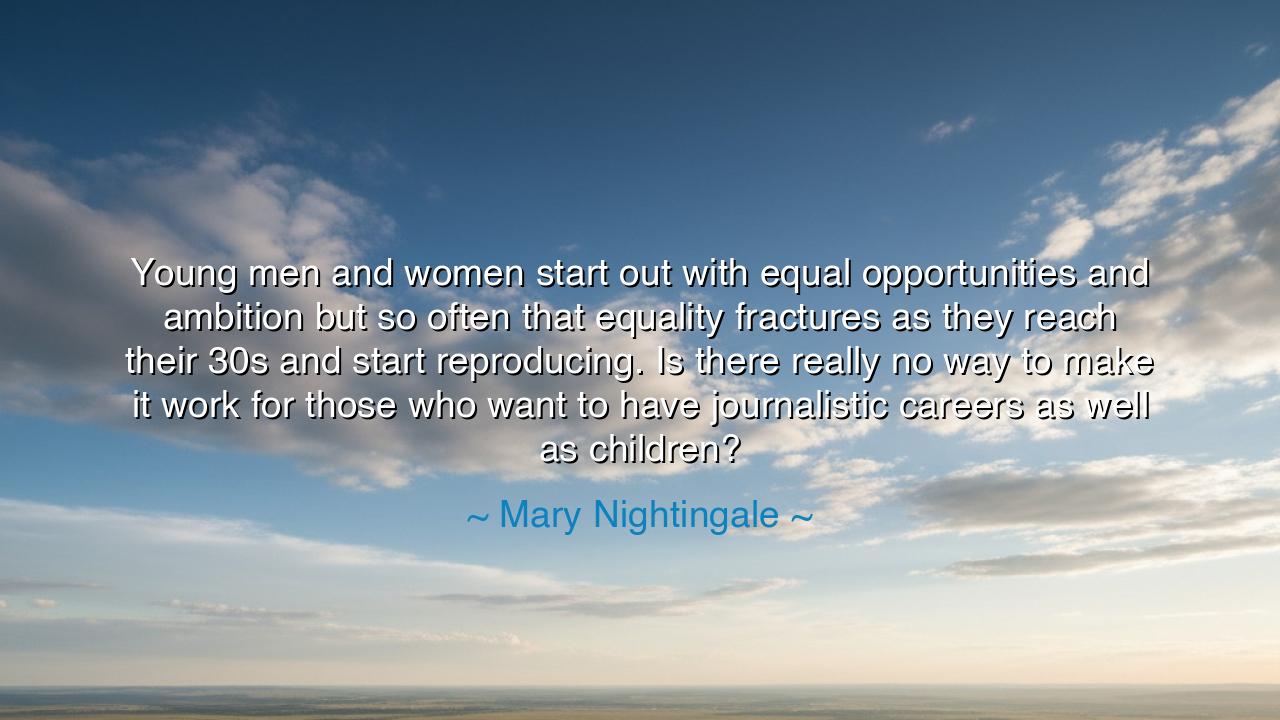
Young men and women start out with equal opportunities and
Young men and women start out with equal opportunities and ambition but so often that equality fractures as they reach their 30s and start reproducing. Is there really no way to make it work for those who want to have journalistic careers as well as children?






In the grand scheme of life, it is said that the seeds of ambition are planted early, and that all men and women begin their journeys with the same hope in their hearts—a hope for a future where they can achieve their dreams, unfettered by the burdens of society's limitations. Mary Nightingale echoes this truth in her poignant words: "Young men and women start out with equal opportunities and ambition but so often that equality fractures as they reach their 30s and start reproducing. Is there really no way to make it work for those who want to have journalistic careers as well as children?" This is not just a question of career or family, but a deeper inquiry into the very nature of balance, equality, and choice.
The ancients knew well the tension between career and family. Consider the great philosophers who sought the wisdom of the ages, yet often had families of their own. Aristotle, despite his devotion to the pursuit of knowledge, took a wife, Pythias, and fathered children. Yet, it is said that his life was shaped more by his intellectual pursuits than by the hands-on rearing of his own progeny. This tension—between duty to self and duty to family—has plagued humankind for as long as there have been families and aspirations. It is a struggle that, as Nightingale notes, deepens as men and women enter their 30s and the responsibilities of parenthood begin to shape their paths.
Let us consider the tale of Cleopatra, whose reign over Egypt is remembered as one of unmatched brilliance, yet she too faced the pull between her royal duties and her role as a mother. In her love for Julius Caesar and later Mark Antony, she sought to build an empire that would stand the test of time, even as she nurtured children who would inherit it. And yet, despite her genius, her ability to truly balance the demands of leadership with those of motherhood remains a subject of much debate. How could a woman of such power manage both? Her life speaks to the very struggle Nightingale speaks of—ambition and family often stand at odds, and the question remains: can they coexist?
In the modern world, this dichotomy is even more pronounced. The journalistic career, a path that demands commitment, time, and the freedom to roam the world in search of truth, often clashes with the demands of raising children. Women, in particular, feel the weight of this conflict, for they are the ones who often bear the primary responsibility for caregiving. Yet, as Nightingale so aptly asks, is there no way to make it work for those who wish to pursue both their career and family? The answer, in truth, lies not in the elimination of one for the sake of the other, but in the creation of a new balance, a new way of living that honors both the self and the family unit.
History offers examples of individuals who have managed to navigate this balance, though not without great effort. Marie Curie, one of the greatest scientists in history, continued her work in radioactivity even after marrying and raising two daughters. Her life was one of remarkable sacrifice, and though she was often torn between her scientific passions and her maternal responsibilities, she never let go of her pursuit of knowledge. Curie’s story speaks to the possibility of achieving both—though it is clear that such a path is fraught with difficulty and requires a profound commitment to both career and family.
The lesson we take from Mary Nightingale’s words is one of profound importance: equality, in the purest sense, means that both men and women should have the freedom to pursue their passions and dreams without being forced to choose between their career and family. It is a call to recognize that parenthood need not be a barrier to success, nor should the pursuit of a career mean the neglect of one’s children. The ancients understood that balance is the key to a life well-lived, and so must we. It is our task to create systems, both in society and within ourselves, that allow for the nurturing of both the mind and the family.
Let us take action in our own lives. Let us seek to forge a future where equality is not just a lofty ideal, but a living, breathing reality. Let us support those who strive to balance the demands of career and parenthood, and recognize that sacrifice does not always mean the loss of one’s dreams. Mothers and fathers, alike, must be given the space and the support to pursue their ambitions, and to raise children who will one day carry on their legacies. True equality lies in the freedom to choose one’s path, without fear of sacrificing one for the other. Only then will we honor the full potential of every human being.






AAdministratorAdministrator
Welcome, honored guests. Please leave a comment, we will respond soon